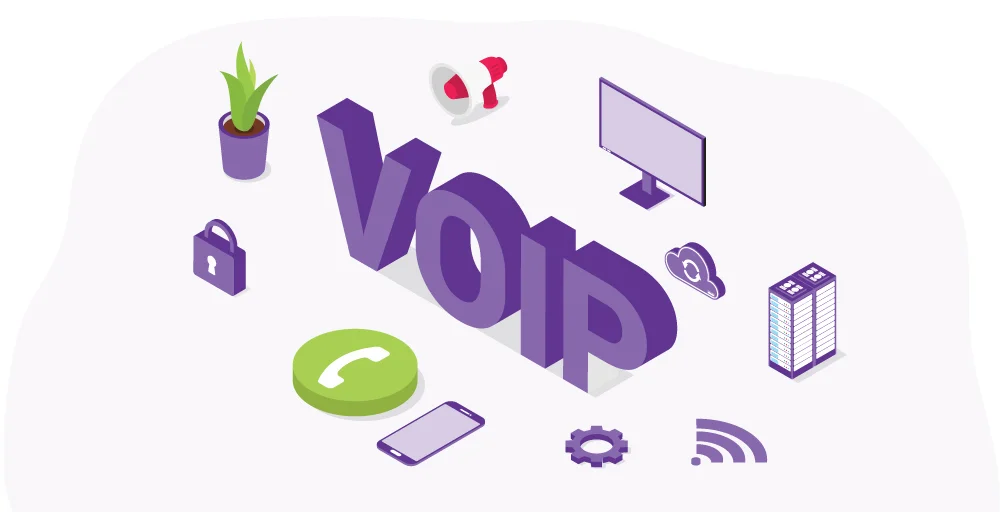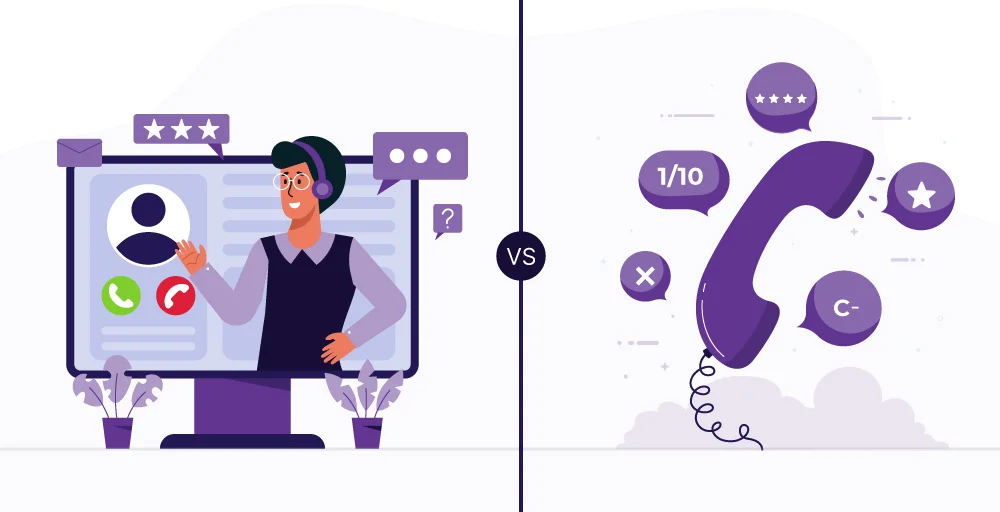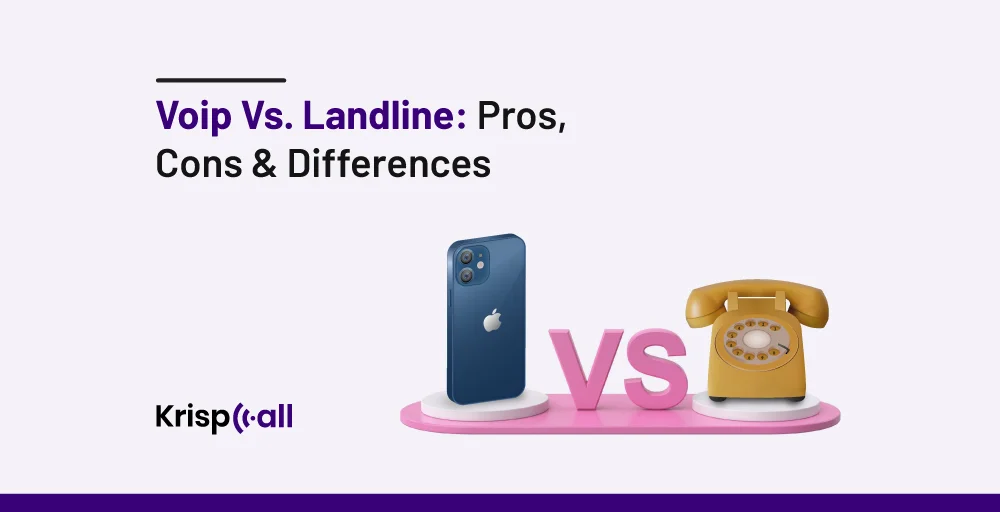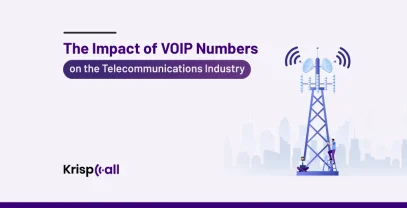Are you tired of using the ‘same old’ telephone system designed long ago?
The world has changed, and the way we do business has transformed. But, the one significant device that connects us with people worldwide is still stuck in the past.
Maybe you’re thinking 🤔if there were a better option than a landline phone, you’d be the first one to jump the gun 😆. What if I tell you that such modern technology is already available as “VoIP?”
Perhaps you may still hesitate to stick with the landline or explore VoIP. Various factors, such as cost, reliability, and functionality, come into play when making such decisions.
Don’t fear—we’re here for you! 🥰
In this article, we’ll compare VoIP Vs. Landlines and guide you toward the best phone system for your business needs. Let’s dive in!
🔑 KEY HIGHLIGHTS
- VoIP and landlines differ in various aspects, including mode of communication, cost, and mobility.
- VoIP phone systems use the Internet to make and receive calls, while landlines use copper wire to communicate.
- VoIP offers flexibility, portability, and cost-effectiveness, making it a clear winner over landlines.
What is VoIP?

Voice over Internet Protocol (VoIP) is a phone system that uses the Internet to receive and make calls instead of traditional landlines. It turns the sound of your voice into digital data that is then sent over the Internet.
You can use your computer, smartphone, or other mobile devices to make VoIP calls. As Internet access has become more common, VoIP has become a popular personal and business communication choice.
Pros of VoIP
Some of the benefits of using VoIP include:
- Budget-friendly
One of VoIP’s main advantages is its budget-friendliness. It eliminates the need for different equipment, expensive wiring, and more. Also, direct calling via the Internet reduces expenses compared to traditional landline phone providers, lowering monthly costs.
- Flexibility
VoIP allows users to work from anywhere with internet access. Remote work becomes more manageable with VoIP communication solutions in place. Also, VoIP enables you to make and receive calls from any device, like computers, laptops, and mobile phones, giving you more flexibility making it a better choice. You can also consider few of key factors before choosing VoIP.
- Easy to Manage and Set up
You might have faced lots of hassle while setting up a traditional phone system in your company. All those wires and maintenance from time to time can be frustrating to anyone.
However, in the case of VoIP, all you need to do is download an app or contact a VoIP service provider like KrispCall. After that, you can start using VoIP service. That way, you can easily install, configure, and maintain it, even without the help of a professional’s technical support.
- Higher Scalability
One of the great things about VoIP is that it is highly scalable. You can add or remove phone lines, extensions, features, and users whenever you want. Also, with VoIP’s virtual phone system, you don’t need to invest in expensive hardware or new phone lines as a business phone system expands.
Cons of VoIP
As there are a lot of advantages to using VoIP service, there are also some disadvantages of
using this new technology.
- Dependence on the Internet
VoIP relies entirely on Internet connectivity. Any disruption to the internet service interrupts VoIP communication, making it unavailable during instances such as electricity outages. Also, VoIP users require a stable and high-speed internet connection to ensure proper communication quality. Slow internet speeds or unreliable Wi-Fi can reduce call quality and disruptions during conversation.
- Power needs
To operate, your modem, router, ATA, and other VoIP equipment must be connected to an electrical power source. If you experience a power outage, your phone service will also be affected. Even with a UPS (uninterruptible power supply), the backup power will only last for a brief period, offering limited assistance.
- Security problem
Another major setback of VoIP is security issues. Since VoIP data travels over the Internet, there can be identity theft, virus malware, denial of service, spam, call tampering, and phishing attacks. Many attackers may attempt to steal user identities, hijack VoIP services, gain unauthorized access to call data or use someone else’s account for malicious purposes.
- Emergency call limitation
Whenever someone calls for emergency help, it’s important to know where they are so that responders can get there quickly. However, since the VoIP phone system isn’t associated with a specific location, calls can originate from anywhere with an internet connection. Hence, it becomes difficult for emergency personnel to figure out where you are exactly located.
What is Landline?

A landline is a traditional phone system that sends voice signals through physical wire. It uses copper wiring or fiber optic cable to transmit voice audio from one phone to another.
A traditional landline phone’s wire is connected directly to the public switched telephone network (PSTN), which allows users to communicate through voice. Moreover, Landline phone systems are analog phone systems installed by the local phone company. They’re also known as Plain Old Telephone Service (POTS).
Pros of Landline
Here are some advantages of using a landline:
- Excellent call quality
As we all know, a landline uses wires to transmit signals. The physical connection provided by wires offers more consistent and reliable voice signal transmission than internet-based systems, which results in more precise audio quality.
- Best for emergency use
Even though we barely use landlines to make calls these days, they can be the best option in emergencies. They are linked to a specific address that helps medical personnel find your location. Also, you can still use a landline if there is a power outage, as it doesn’t need internet or recharge.
- Doesn’t rely on the Internet
VoIP entirely relies on the Internet, so if the Internet is down, VoIP doesn’t work. This is not the case with Traditional landlines, as they have a completely different system. They simply rely on a wire and PBX system.
- Better security
Landline phones provide more security than VoIP cell phones as they don’t use wireless signals to communicate. In fact, the call is transferred through a wire cable, which is much more secure than VoIP.
Cons of Landline
These are some of the cons you encounter when dealing with landlines:
- Expensive
Landline phones are much more expensive than VoIP phone systems. A landline system uses various equipment, such as wire, box, and system, which can be costly. In addition, landline phone service can be more expensive, especially when calling long distance. Plus, the cost of a monthly subscription is increasing daily.
- Limited feature
Landline phones have limited call management features compared to VoIP. They lack several features, such as call forwarding, call transferring, IVR, call routing, or call queuing, which are essential to handling calls effectively.
- Dependency on infrastructure
As VoIP depends on the internet, a landline relies on infrastructure like wire and cable. Various sources, including natural disasters like earthquakes, hurricanes, floods, accidents, etc., can easily damage traditional landline systems’ wires and cables.
- Less flexibility
Landline phones are designed to be installed and set up in only one location. That means they can only be used near their connection point. Moreover, relocating landline phones can be extremely frustrating when users change residences or office locations.
Key Difference between VoIP Vs. Landline for business

Although landlines and VoIP serve the same purpose: to allow users to connect with anyone via phone calls whenever they want, they differ in several aspects. These aspects include:
1. Method of Communication
The most apparent difference between VoIP and landline is their method of communicating. VoIP uses the Internet to make and receive calls. On the other hand, landlines use copper wire to communicate. This means that VoIP calls can be made anywhere with an internet connection, while landline calls are restricted to some geographical regions.
Likewise, VoIP converts your voice into digital data packets and sends them over the Internet. In contrast, landlines send voice signals through a physical wire.
2. Cost
Another significant difference is its cost. With landlines, you often have to pay a lot upfront for setting everything up, like installing phone lines and getting equipment. On the other hand, VoIP systems usually need less setup and equipment since they use the internet.
Also, monthly fees for landlines can add up, especially with long-distance calls and extra features like voicemail. VoIP services often offer affordable monthly rates, including many features and cheaper long-distance calls.
VoIP systems also need less maintenance and are easier to expand if your business grows. So, overall, VoIP can be cheaper and more flexible than traditional landline phones.
3. Mobility
VoIP offers higher mobility compared to traditional phones. Landline phones are fixed in one location/place. That means you can’t take them when you leave that location.
In contrast, since VoIP operates over WIFI, you can make and receive calls from anywhere, whether at the office or home, as long as you have internet access. You’re not tied down to a specific location like you are with landline phones.
Which Phone system is best for Businesses?
Various factors, including cost, flexibility, reliability, and specific business needs, influence the choice between landline and VoIP phone systems.
Landlines provide excellent call quality, security, and reliability but are very costly and less flexible in terms of features and mobility. However, in the end, landline phone service doesn’t have a chance against VoIP’s advanced features, cost-effectiveness, mobility, and scalability.
💯 Therefore, a VoIP business phone system is the best for businesses.
If you are looking for the best VoIP phone system for your business, you should go for a cloud-based one. KrispCall, for example, provides cloud-based VoIP business phones at an affordable cost, starting from only $15/month. Also, its phone system comes with a wide range of VoIP features like Unified Callbox, call monitoring, call forwarding, call analytics, IVR, auto-attendant, and many more.
Moreover, it ensures extensive coverage by providing virtual numbers from over 100 countries. KrispCall is available on multiple platforms, such as web, desktop, and mobile apps.
Investing in a good VoIP service provider can significantly enhance communication capabilities, streamline workflows, and improve overall business efficiency.
FAQs
Voip vs. landline – which’s better?
VoIP is far better than landline due to its advanced features and low cost.
Is call quality in Voip better than that of Landline?
Yes, the call quality in Voip is better than that of Landline. VOIP services are known for their excellent sound quality, but traditional landlines can also provide reliable communication options.
Is Voip a landline?
No, VoIP isn’t a landline. VoIP is a phone system that uses the Internet to make calls, while a landline is a traditional phone system that uses copper wire to make and receive calls.
Is Voip cheaper than a landline?
Yes, VoIP is much more cheaper than landline as it doesn’t require expensive hardware.
Can I keep my landline phone number while switching to VoIP?
Yes, you can keep your landline number when switching to VoIP.
Is a VoIP Phone system more reliable than Landline?
Yes, a VoIP phone system is more reliable than a landline. VoIP technology has made significant advancements and can offer high reliability with a stable internet connection.





